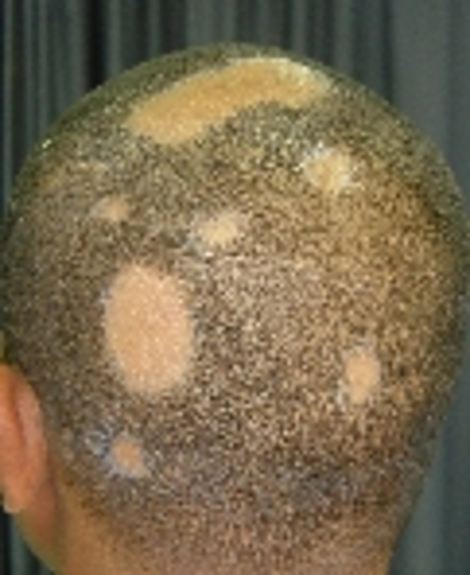Stress and Alopecia Areata
Saturday, September 5th, 2009 Alopecia Areata (AA) is an autoimmune hair loss condition. It presents itself in the form of patchy hair loss on the scalp or other areas where hair exists. Some have questioned if AA can also be triggered by emotional stress. It has been discussed in some medical journals but the exact mechanism has never been explored. There has been a study conducted and published on the relationship between stress and the pathogenesis of alopecia areata. This was done by subjecting AA-affected and normal lab mice to ether anesthesia (stress) through restraining the animal.
Alopecia Areata (AA) is an autoimmune hair loss condition. It presents itself in the form of patchy hair loss on the scalp or other areas where hair exists. Some have questioned if AA can also be triggered by emotional stress. It has been discussed in some medical journals but the exact mechanism has never been explored. There has been a study conducted and published on the relationship between stress and the pathogenesis of alopecia areata. This was done by subjecting AA-affected and normal lab mice to ether anesthesia (stress) through restraining the animal.
The mice with alopecia areata had a marked increase in hypothalamic-pituitary-adrenal tone and activity centrally and peripherally in the skin and lymph nodes. Plasma corticosterone, adrenocorticotropic hormone, and estradiol levels were determined in this study as indicator or stress level, whereas gene expression in brains, lymphoid organs, and skin was measured by quantitative RT-PCR for corticotropin-releasing hormone, arginine vasopressin, proopiomelanocortin, glucocorticoid receptor, mineralocorticoid receptor, corticotropin-releasing hormone receptor types 1 and 2, interleukin-12, tumor necrosis factor-alpha, and estrogen receptors type-1 and type-2.
Compared to normal mice, there was an altered interaction seen between the adrenal and gonadal axis proving that the stress level in those animals was in fact higher. Stress also caused changes in the activity of the hypothalamus pituitary axis in the mice with AA.
In addition, animals with AA had significantly blunted corticosteroid and ACTH responses to acute ether stress (physiological stressor) and a deficit in habituation to repeated restraint stress (psychological stressor). These findings further suggest that altered brain responses caused by stress may be associated with the occurrence of alopecia areata, proving the hypothesis that stress plays an important factor.
Treatment of AA is done through observation of the patient and, in some cases, steroid injections can also prove useful. These treatment options have shown some improvement in those who have extensive types of AA like Alopecia Totalis. We do not recommend any patient to get hair transplant surgery if they have active AA since the chance of losing the newly transplant hair is very likely.
Although AA is not genreally treated with hair restoration, we at our offices of US Hair Restoration in LA, BH and Orange County visit and treat patients of AA in a regular basis.
